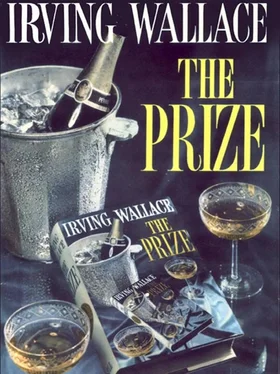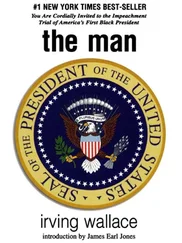‘No.’
‘But of the others?’
‘Of course, Carl. What do you take me for?’
Quickly, Krantz went on with his story. ‘Gabriela Mistral had been published in Mexico and Latin America, and almost nowhere else. As far as Sweden was concerned, she was unknown. Her chances for a Nobel award were less even than Max Stratman’s. Gullberg tried to sell Gabriela Mistral to his colleagues, but they curtly rebuffed him. Undeterred, Gullberg made up his mind to win single-handedly for his candidate the prize. An ambitious undertaking, I assure you.’
‘I can see that.’
‘Gullberg set himself to work translating her best poems into Swedish, a formidable task, and then he had the translations published. He promoted the published works. He sent copies to all members of the Swedish Academy. His translations were magnificent, and this, along with other politicking, I imagine, turned the tide. Gabriela Mistral, an unknown, an underdog, really an impossibility, Hans, won the Nobel Prize in literature for 1945. Now, there you see how it can be done.’
Eckart allowed this to sink in, and then he inquired, ‘Now tell me how you did it, Carl.’
‘Stratman?’
‘Yes, Stratman.’
‘We must go back to our meeting in Berlin,’ said Krantz. ‘You had summoned me to inquire if I would consider taking the chair of physics at Humboldt University, and I said it was the dream of my life. And you said that my application would be entered, there might be an opening soon, but you did not wish me to resign yet from my membership on the Nobel Physics Committee of the Academy of Sciences. You said that it was important to you, the university, to the East German government, that Max Stratman be awarded the physics prize and be brought to Stockholm. Since you knew my respect for Stratman, his work, you preferred to have me in Stockholm, doing my part, until Stratman won the prize. The understanding was-when I had delivered Stratman, you would favourably act on my application.’
Eckart flinched slightly. ‘I do not think we put it as bluntly as that, Carl.’
Krantz would not be turned aside. This was vital. ‘That was your implication, Hans.’
‘Implication, yes. No question. We respect and reward our friends.’
‘I did not ask you why you wanted Stratman in Stockholm. I felt that was not part of our-the implication of our deal.’
‘I think I have told you-we wanted him here, nearby, in a free and neutral climate, away from his captors and bodyguards, where we could talk to him-I could see him as an old friend, merely that, nothing more.’
‘The point I make is that I did not bother you with my ambitions,’ said Krantz. ‘You spoke to me of a position to which I have aspired all my life. Quite reasonably, you asked if, first, I could remain where I was, to throw my influence as a voting judge behind a candidate you desired to be elected. Your wish was my wish, as if a command. I tell you that in sincerity, Hans.’
‘We are proud of your friendship, Carl.’
Krantz nodded. ‘I promised you that I would do what I could do, but even then, I did not foresee the difficulties. Stratman was duly nominated, as I have told you, and that was a beginning. All through the spring and summer, I acquired Stratman’s published papers, and, like Gullberg, translated them with care, and sent them to my voting colleagues with personal notes. I tried, through faculty friends abroad, to learn what details I could of Stratman’s actual discovery, the specific solar conversion and storage method, but I ran into a stone wall. American security deprived me of precious details. What I did obtain were zealous endorsements of the discovery, from those who had been eyewitnesses to its results and values. All of this correspondence I translated, and passed around to the other judges. During the summer, I was instrumental in bringing two physicists, one English, the other Russian-’
‘Yes, we helped clear the way for the Russian to come here.’
‘Did you? Well, I thought it had been too easy. It was wise of you, Hans. He came, and the Englishman, and since they were specialists in solar work, they gave valuable lectures-I saw to it that my colleagues attended-and I saw to it that the speakers gave praise to Stratman, and in both cases, my encouragement was not necessary, for their praise would have been lavish anyway. By then, I think, my fellow judges were properly orientated, Stratman-conscious, and for the first time, he was a serious candidate.’
‘You are a wonder, Carl.’
‘You have only heard half of it, Hans. The most decisive half lay ahead of me in the autumn. My original work had been constructive. To build up Stratman. Now, I shifted my gears. My next work became, necessarily, destructive, to destroy the competition. Believe me, the competition was serious this year. We are in the age of physics, and there is an overabundance of eligible candidates. A series of informal lunches with my fellow judges produced the names of three favourites running ahead of Stratman. I will not bother you with full-length biographies. Suffice it to say, one was that damn Norwegian with his latest findings in the low gravitational field. Another was the Spaniard, the meterologist, the one with the new cloud chamber, who claims to have made the first inroads in weather control. The third was an Australian team that had made advances in high-frequency transport-I must confess, fascinating-an elaborate theory, and some evidence, of building underground cables beneath concrete highways and rails to propel vehicles electrically. There was competition, you can see, and demonstrated, whereas Stratman’s findings, though doubtless more important, were made to seem impractical by loathsome secrecy.’
‘What was your next step, Carl? How did you sabotage the competition?’
Krantz felt uncomfortable. He pretended to devote himself to his driving, eyes on the three-pointed silver star above the grille. ‘I do not think the exact details are pertinent.’
‘They are to me,’ said Eckart. ‘We know your resourcefulness in theory. We want to see it proved.’
‘The Norwegian was easiest to dispose of. I wrote a learned paper-I must show it to you-proving that antigravity, if controlled by Norway, could be harmful to Sweden. It would give our neighbour terrible ascendency in rocket propulsion and what-not. I knew that this would strike at our judges’ nationalistic pride. Moreover, to give them a graceful backing off, I indicated that many of the Norwegian’s experiments had dealt with the value of antigravity fields in medicine as well as physics-you know, relief of heart sufferers-and I indicated that his candidacy should be considered, next year, by the Nobel Medical Committee. I circulated my paper, and I am happy to say that the Norwegian received only two votes. As to the Spaniard, with his weather control, I was able to learn that he was a Falangist, and so I located several exiled Spanish scientists, of unimpeachable repute, and invited them to be my devil’s advocates. Their letters were “volunteered” to the leaders of our committee. Their disparagement of the Falangist’s discovery was most effective, I must say. The Australians were another matter. Their high-frequency invention was well regarded everywhere. Moreover, it was a safe prize, noncontroversial. There was no chance of my getting at them through their work.’
‘What could you do?’
‘I could get at them through themselves,’ said Krantz placidly. ‘I have a man here in Stockholm, a refugee of long standing, who is useful in these matters. He is a Hungarian. He had served one of the Axis powers, in World War II, as a minor espionage agent. He likes to think of himself as a free-lance spy, still, but he is actually a pathetic buffoon. Yet, on several occasions, I have employed him for research and found him valuable. He is literate and bookish. He has good connections among the international press. They feed him titbits in exchange for news trifles. He thinks of himself as another Wilhelm Stieber or Fräulein Doktor Schragmüller, but he is actually a librarian, a researcher. I hired him to investigate the Australians.’
Читать дальше












